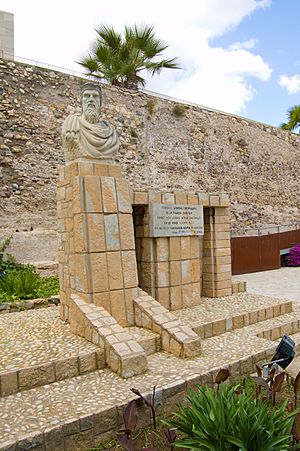Hasdrubal the Fair facts for kids
Quick facts for kids
Hasdrubal the Fair
|
|
|---|---|

Hasdrubal bust in Cartagena, Spain
|
|
| Born | Circa 270 BC Carthage
|
| Died | 221 BC |
| Cause of death | Assassination |
| Occupation | Military leader and politician |
| Predecessor | Hamilcar Barca |
| Successor | Hannibal |
Hasdrubal the Fair (born around 270 BC, died 221 BC) was an important leader from Carthage. Carthage was a powerful ancient city in North Africa. Hasdrubal was a military general and a politician. He became the governor of Iberia (modern-day Spain and Portugal) after his father-in-law, Hamilcar Barca, passed away. He is also famous for founding the city of Cartagena.
Contents
Who Was Hasdrubal the Fair?
Hasdrubal was a key figure in Carthaginian history. He helped expand Carthage's power in Iberia. He was known for his smart diplomacy, which means he preferred talking and making agreements over fighting wars.
Hasdrubal's Family Connections
According to ancient Roman writings, Hasdrubal was related to two other famous Carthaginian leaders. He was the son-in-law of Hamilcar Barca. This means he married Hamilcar's daughter. He was also the brother-in-law of Hannibal, who became one of the most famous generals in history.
Hasdrubal's Rise to Power
Hasdrubal joined Hamilcar Barca in his campaigns. Hamilcar was working to gain more power for Carthage. They went to Iberia around 237 BC. Hasdrubal helped Hamilcar make agreements with local tribes. For example, he helped the Numidian tribes in North Africa become allies of Carthage. This made Carthage even stronger.
Taking Command in Iberia
In 228 BC, Hamilcar Barca died while fighting Iberian tribes. Hasdrubal then took over as the leader of the Carthaginian forces in Iberia. Hamilcar's sons, including Hannibal, were too young to lead at that time. Hannibal was only 19 years old.
Diplomacy Over War
Unlike Hamilcar, Hasdrubal was a master of diplomacy. He liked to make treaties and agreements instead of fighting battles. He would ask for important people, called hostages, from other kingdoms. This was a common way to make sure treaties were kept.
Hasdrubal used his skills to expand Carthage's territory. He also made it stronger by building a very important city.
Founding Cartagena
Hasdrubal founded a new city and naval base called Qart Hadasht. The Romans later called this city Carthago Nova, which we know today as Cartagena. This city became the capital of Carthage's new province in Iberia. It was a very important place for ships and trade.
Treaty with Rome
Hasdrubal also made a very important treaty with the Roman Republic. This treaty set the River Ebro as the border between the two powers. This agreement happened because Greek and Iberian cities, like Ampurias and Sagunto, were worried about Carthage's growing power. They asked Rome for help. Hasdrubal agreed to the treaty, even though he didn't really want to. He knew Carthage wasn't strong enough yet to fight Rome. He wanted to avoid a big war too soon.
Hasdrubal's Death
Hasdrubal the Fair was assassinated in 221 BC. This was seven years after Hamilcar's death. He was killed by a slave of a Celtic king named Tagus. The slave was getting revenge for his master's death.
After Hasdrubal's death, his brother-in-law, Hannibal Barca, became the new leader. Hannibal would go on to become one of the most famous military commanders in history.
See also
 In Spanish: Asdrúbal el Bello para niños
In Spanish: Asdrúbal el Bello para niños
- Other Hasdrubals in Carthaginian history
 | Shirley Ann Jackson |
 | Garett Morgan |
 | J. Ernest Wilkins Jr. |
 | Elijah McCoy |

